Renewable-hydrogen – PET-Bottle 20-07-2022 - Arhive
Renewable-hydrogen – PET-Bottle
Crude Oil Prices Trend
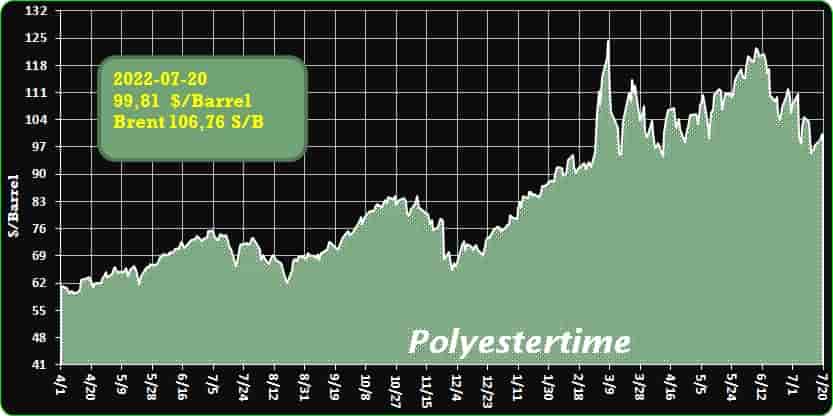
-LyondellBasell helps to close the loop on Polypropylene by joining NEXTLOOPP initiative
NEXTLOOPP, launched in October 2020, aims at creating circular food-grade recycled polypropylene (FGrPP) from post-consumer packaging. LyondellBasell , one of the largest plastic and chemical companies in the world, has recently joined the initiative that brings more than 40 major industry players together.
“To unlock the full value of plastics, critical gaps must be addressed so these valuable resources can be circulated back into the economy after use.
The development of innovative, new solutions and the increase of recycling rates is key to addressing plastic waste and climate change,” says Richard Roudeix, Senior Vice President Olefins & Polyolefins EMEAI at LyondellBasell.
“In the area of post-consumer polypropylene for food packaging, we are eager to join and support the research of the NEXTLOOPP project, together with other industry players, to help find new solutions.” Renewable-hydrogen – PET-Bottle
Polypropylene is the most widely used plastic in food packaging. NEXTLOOPP is able to close the loop on polypropylene (PP) by using a combination of cutting-edge technologies, developed by Nextek Ltd. It does this by separating food-grade PP from the rest, and by decontaminating the polymer to ensure compliance with food-grade standards in the UK, EU and the U.S. Following outstanding results of its innovative tracer-based sorting trials, Nextek Ltd recently started production trials of food-grade compliant recycled PP, making over 60 different products from NEXTLOOPP’s four grades of PPristine food compliant and INRT rPP grade resins.
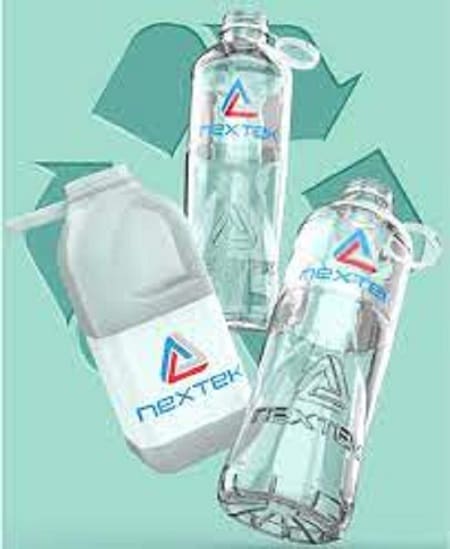
-CO2→ formate conversion technology with significantly improved production rate
Enhancement four times the conventional production rate, 100 times the durability compared to conventional commercial electrodes. High potential use for LOHC hydrogen reservoir. Renewable-hydrogen – PET-Bottle
“Carbon dioxide as a resource” and “hydrogen energy utilization” are considered to be the most practical measures to realize carbon neutrality. However, technological innovation is essential for them to be feasible both environmentally and economically. To this end, a Korean research team developed a proprietary technology that harnesses the synergy of both fields: “carbon dioxide as a resource” and “hydrogen energy utilization.”
The Korea Institute of Science and Technology (KIST; President: Seok-Jin Yoon) reported that the research group of Dr. Hyung-Suk Oh at the Clean Energy Research Center has developed a technology that stably converts carbon dioxide into useful liquid compounds (formate) by performing high-volume synthesis with fluorine-doped tin oxide catalysts. Also called methanoic acid, formate is a basic chemical raw material used in various industries such as food processing, preservatives, dyeing agents, plasticizers, snow removal agents, and cure retardants owing to its distinctive sour taste, anti-bacterial properties, and its ability to control pH. In recent years, it has also been in the spotlight as a raw material for eco-friendly biodegradable plastic. Renewable-hydrogen – PET-Bottle
Because most formate is currently produced via the thermo-chemical reaction of fossil fuels, carbon dioxide emissions are inevitable during the manufacturing process.
While it can be manufactured in an eco-friendly manner if carbon dioxide is directly converted into formate via an electro-chemical reaction, it would be necessary to increase electrode material performance responsible for converting the gas to a liquid phase, and to ensure durability, which allows electrodes to function stably for a long time.

-Coperion to display new extruders, valves, and pelletizers at K 2022
At K 2022 Coperion and Coperion K-Tron will be presenting a variety of new and ongoing developments that will increase the efficiency of plastics compounding processes, help boost conscientious resource handling, and achieve high product quality.
Coperion will be exhibiting an entire production line for recycling polyethylene terephthalate (PET) at their booth within the VDMA’s Circular Economy Forum. Exhibits will encompass bulk solids handling, feeding, extrusion, and pelletizing, all representing Coperion’s advanced expertise in numerous plastics recycling processes such as chemical recycling, multilayer film recycling, and upcycling. Renewable-hydrogen – PET-Bottle
Trailblazing new developments from Coperion, such as the ZS-B MEGAfeed side feeder that enables plastic film and flake recycling in very high throughput dimensions, will be shown.
Plastic recycling solutions for more efficiency in classic compounding tasks
At the Coperion Booth will be the ZSK Mc18 extruder with a 70 mm screw diameter. With its specific torque of 18 Nm/cm3, it is suited for compounding plastics at high throughput rates and with low energy consumption. The ZSK extruder is equipped with a ZS-B easy side feeder as well as a ZS-EG side devolatilization unit. Both the ZS-B as well as the ZS-EG reduce the time needed for recipe changes or maintenance tasks since they can easily be removed from the process section. A K3-ML-D5-V200 vibratory feeder from Coperion K-Tron will be on display at the main intake of the ZSK 70 Mc18. The ZS-B easy will be equipped with a K-ML-SFS-BSP-100 Bulk Solids Pump (BSP) feeder.
Another highlight at the Coperion booth will be the STS Mc11 series laboratory extruder with a 25 mm screw diameter. It has a simple design, is user-friendly, and can be easily cleaned. The STS 25 Mc11 will be exhibited with a Coperion K-Tron K-ML-SFS-KT20 twin screw feeder.
The new, preconfigured ProRate PLUS feeder line will be available to view in all three available sizes: small, medium, and large. This gravimetric feeder from Coperion K-Tron is an economical solution for reliable feeding of free-flowing bulk materials.
The SP series dual-bearing strand pelletizers have been given an update. Coperion’s SP340 model will represent this development at the K booth. In comparison to the previous model, the new SP strand pelletizer allows for a faster recipe and colour changes. The cutting chamber works with no dead space. Due to its quick-release function, the cutting unit can be quickly swapped out. The pelletizer’s interior has improved accessibility and is very easy to clean. Renewable-hydrogen – PET-Bottle
One further highlight of Coperion’s showing at K 2022 will be the ZXQ 800 rotary valve. This valve, which works with low gas leakage, was developed by Coperion for powder intake into pneumatic conveying lines at up to 3.5 bar. The valve is suited for systems planned for polyolefin manufacturing in the future.
As a raw material, plastic can make a valuable contribution to environmental protection and to the energy revolution. The key to both is the efficient recycling of plastics. For this reason, plastics recycling is the focus of comprehensive development projects at Coperion. The company will show the results of these projects at K 2022. There, Coperion will present its combined process solutions and technologies for the economical recycling of various plastics while achieving the highest levels of product quality. At the centre will be a system built around a ZSK 58 Mc18 twin screw extruder configured for manufacturing high-quality PET using recycled materials.
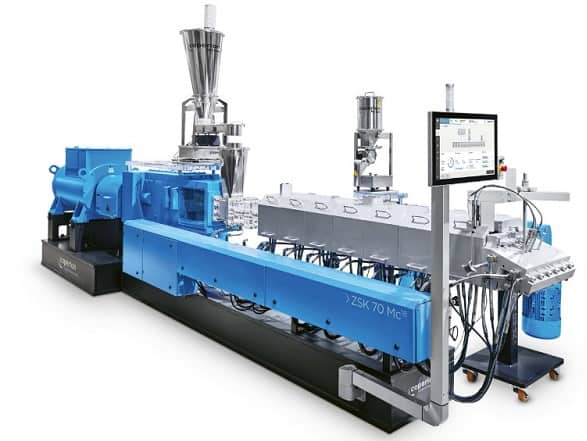
-Repsol and Navantia jointly explore renewable hydrogen generation opportunities
Repsol and Navantia Seanergies, Navantia’s green energy division, have signed a collaboration agreement to jointly explore business opportunities in renewable hydrogen production in Spain, said the company.
Tomas Malango, Hydrogen Director of Repsol and Javier Herrador, Director of Navantia Seaenergies, signed the agreement in the presence of Francisco Conde, Vice President of the Xunta de Galicia and Regional Minister of Economy and Industry, Raul Blanco, General Secretary for Industry and SMEs, Juan Abascal, Executive Director of Industrial Transformation and Circular Economy of Repsol and Ricardo Dominguez, President of Navantia. Renewable-hydrogen – PET-Bottle
The event was also attended by Jose Minones, the Government delegate in Galicia, Angel Mato, mayor of Ferrol, Valentin Gonzalez Formoso, president of the Provincial Council of A Coruna and Maria Rivas, subdelegate of the Government in A Coruna, among other authorities and representatives of business and social entities.
The signing took place at Navantia’s Turbine Factory in Ferrol, a center that will play a key role in this agreement. The two companies have agreed to combine knowledge and efforts for the industrial development of renewable hydrogen. On the one hand, Navantia Seaenergies has announced the start-up of an electrolyzer production line at its Turbine Factory in Ferrol. Renewable-hydrogen – PET-Bottle
On the other hand, Repsol will promote the installation of this equipment for the production of renewable hydrogen in its ambition to lead the market in the Iberian Peninsula and thus reach its capacity targets, set at 1.9 GW in 2030.
In this way, both entities seek to position Spain as an international leader in the production of renewable hydrogen, while also contributing to reindustrialization, quality employment and economic development in the country. Juan Abascal, executive director of Industrial Transformation and Circular Economy, stated that “at Repsol we are convinced that initiatives like this are essential to accelerate the deployment of the hydrogen economy in Spain and Europe from a leadership position.
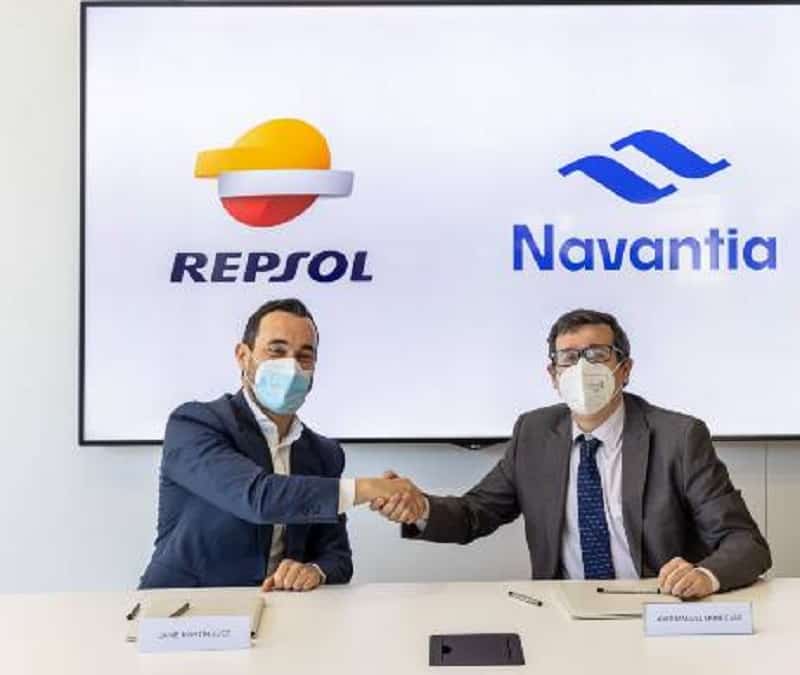
-Advances in PET Bottle & Cap Molding at Drinktec Show
Easier label separation, higher rPET content, Industry 4.0 digitalization options, lighter CSD bottles, and more at German trade fair.
SACMI will show off numerous enhancements for sustainability and productivity in PET bottle and cap production. Renewable-hydrogen – PET-Bottle
Drinktec 2022 in Munich, Germany, Sept. 12-16 will host several developments in molding PET bottles and plastic caps. Some exhibits, such as from Nissei ASB and SACMI, are emphasizing returnable/refillable PET bottles, which are not a significant factor in North America (Mexico and other parts of Latin America are a different story, however). However, SACMI’s new labeling developments for returnable bottles may be of wider interest in PET recycling. Developed by SACMI Beverage for its range of labeling machines is a system for applying glue dots only to the label and not the container. This is said to minimize glue use and facilitate separation of the label from the container during recycling. SACMI is also promoting the use of washable glues that are soluble in alkaline wash water at low temperatures. Utilization of the glue-dot solution requires adding a Speed Coat kit to the labeler. In the case of wraparound labels, this system can apply the glue only to the parts in contact between the two label edges. At the recycling stage, a cutting accessory from SACMI easily separates the label and bottle.
Other SACMI news at Drinktec includes enhancement of the rPET processing capabilities of the IPS preform injection system. Up to now, the IPS system could process up to 50% rPET in flake form, which has not been increased to 70-75% through optimized management of the flake and pellet mixture without the need to use two separate feed hoppers.
SACMI also is introducing new Industry 4.0 digitalization options for its cap and preform machinery. Smart Pack is a new digital package that integrates advanced sensor technology and onboard machine checks into SACMI compression molding lines for caps. It’s meant to ensure process stability through “real-time reaction” to process changes, as well as provide preventive maintenance through hydraulic system monitoring. Other claimed benefits are longer mold life through prevention of condensation, improved cooling maintenance, prompt recognition of incorrect resin loading, and up to 60% shorter plug-insertion times through improved digital control. Renewable-hydrogen – PET-Bottle
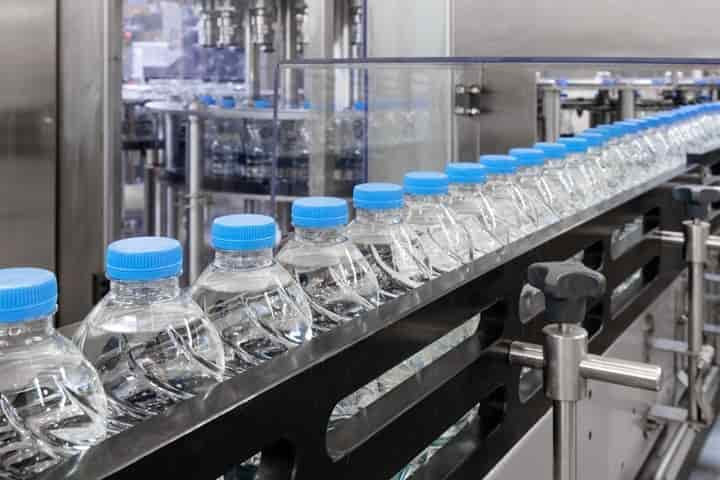
-How can we close the loop on used plastic?
European Circular Economy Leader at SABIC Dimitri Daniels shares insights into mechanical and advanced recycling – and beyond.
According to the latest statistics from the OECD (Organization for Economic Cooperation and Development), less than 10% of plastic waste makes its way to recycling centres, with the vast majority either ending up in landfill or sent for incineration. This approach has a detrimental effect on the environment and locks plastics out of the value chain, destroying any potential future value of used plastic. Renewable-hydrogen – PET-Bottle
ABIC and Plastic Energy are building the world’s first commercial unit to significantly upscale production of certified circular polymers derived from used plastic.
If we want to create a circular economy for plastics, we must establish a value chain where used plastic is retained and re-used. There is no silver bullet solution, and a holistic approach must be taken that incorporates the various technologies and solutions available.
This means considering sustainability from the very start, at product design stage. It also means considering all potential recycling solutions, so that we reduce the volume of more complex plastics going to landfill or incineration. Finally, it also requires manufacturers, suppliers, and customers to come together to drive innovations that can make impact to help the challenges.
SABIC’s TRUCIRCLE™ portfolio and services is our flagship initiative for this holistic approach to improving the sustainability of plastic products, covering a range of services from design for recyclability to the mechanical and advanced recycling of plastics. Our ultimate aim through TRUCIRCLE is to give manufacturers access to more sustainable materials so that they can in turn create products that can be recycled and repurposed.While the challenges are broad and will take time to overcome, collaboration to innovate, upscale and implement new solutions for brands and consumers will be key to moving towards a circular economy for plastics. Renewable-hydrogen – PET-Bottle
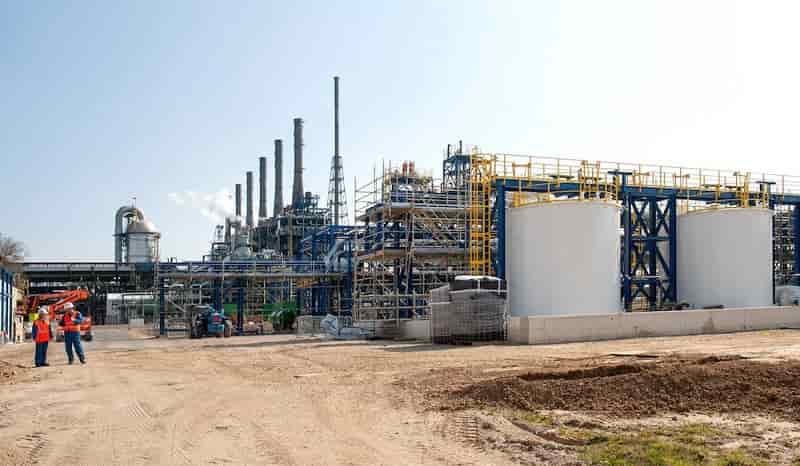
-Siemens’ technology aids Plastic Energy’s recycling
A partnership between Siemens and chemical recycling expert Plastic Energy is helping divert plastic waste from landfills and incineration.
Plastic Energy has a recycling process which transforms end-of-life plastics into recycled oils that can be used to make new plastic products such as food-grade packaging.
The patented technology is currently used in two plants in Spain where Siemens’ automation and measurement technology, including SIMATIC PCS 7 and COMOS MRO, ensure the smooth running of control systems and overcomes the challenge of a complex mix of material consistency. Renewable-hydrogen – PET-Bottle
To meet growing demand for plastic recycling, Plastic Energy is building several larger facilities across Europe, Asia and the US, starting with one in The Netherlands with partner SABIC. These plants will be significantly upscaled and feature Siemens’ end-to-end technology solutions, including Distributed Control Systems (DCS), process instrumentation and low voltage switchgear in the form of SIVACON S8 technology.
The long-term collaboration will enable Plastic Energy to continually evolve its technology and process, implementing improvements for better efficiencies and product quality, and achieve flexibility and scalability for its plant designs.
Plastic Energy is also working with Siemens to unlock further potential using a digital twin. This powerful tool creates a virtual model to give better insights and closed loop optimisation of both process and plant performance.
Steve Leech, business manager for Siemens process control systems, said: “We have viewed working with Plastic Energy as a long-term partnership from the beginning of our relationship, which brings together the process and industry knowledge of Plastic Energy, with our innovative technology portfolio. Renewable-hydrogen – PET-Bottle
“The result is a process plant that is flexible and provides the opportunity for value-add use of the data provided, through using SIMATIC PCS 7 and our instrumentation platforms.
“It is great to be involved with a company so focused on sustainability and contributing to a positive impact on the environment through recycling of plastic waste.”
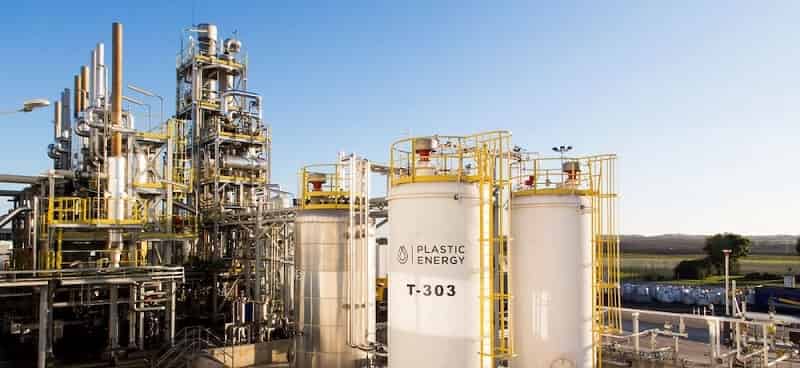
-Fresh investment for Stein Fibers
Stein Fibers has received a significant investment from private equity firm Aterian Investment Partners.
The undisclosed investment in Stein Fibers is the fourth investment from Aterian’s Fund IV, an US$834 million investment vehicle.
Founded in 1976 and headquartered in Albany, New York, Stein Fibers is a distributor and manufacturer of fibre products to the North American furniture, bedding, automotive, filtration, construction and medical markets.
It offers a wide portfolio of fibre and fabrics products across the industry, maintaining a focus on sustainability. Renewable-hydrogen – PET-Bottle
“We could not be more excited to partner with Aterian as we proceed into Stein Fibers’ next phase of growth,” said Chip Stein and Peter Spitalny, Co-Owners of Stein Fibers. “We chose Aterian due to their focus on maintaining company culture developed over decades, commitment to an expedient process, and experience in partnering with family founders like us. We are confident that Aterian is the perfect partner to help us execute on our growth plan both organically and through M&A.”
Michael Fieldstone, Co-Founder & Partner at Aterian, added: “We are thrilled to partner with the talented Stein Fibers team to continue growing the leading supply chain solutions provider in the fiber industry.
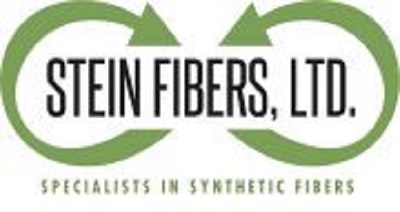
Renewable-hydrogen – PET-Bottle
